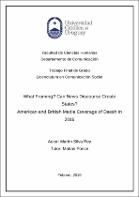JavaScript is disabled for your browser. Some features of this site may not work without it.
What framing? Can news discourse create states? American and british media coverage of Daesh in 2016.
Resumen
Mass media, as part of the public sphere, play a fundamental role in social construction of terrorist organizations. The present research analyzes news framing of Daesh (or “Islamic State”) in 2016, per ideological bias and nationality of the media. Four Anglo-Saxon online news brands are studied through quantitative content analysis to find out the main features of four structural dimensions present in news framing. These are the syntactical structure, script structure, thematic structure, and rhetorical structure. The selected media outlets are MailOnline (British and right-leaning), Guardian Online (British and left-leaning), Fox News (American and right-leaning), and New York Times (American and left-leaning). Analysis of Daesh news framing per ideological bias of the media shows that a vast majority of publications from right-leaning media are wires from international news agencies. Leftleaning media produce mostly original articles, and publish more opinion-based contents than right-wing news brands. The majority of publications from American media are wires from The Associated Press, while wires from Reuters and Agence France-Presse together constitute more than one half of
publications from British news brands. Daesh news framing generally tends to center on the role of the United States in the fight against terrorism. There is consensus around the use of the “Islamic State” designator, which is widespread in all the analyzed media. It discursively legitimizes the stateness of Daesh, while it coexists with the de-legitimizing “terrorist” designator.
Colecciones
- Comunicación [44]


